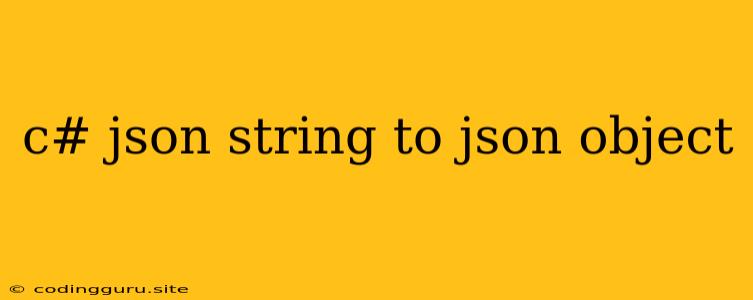Turning JSON Strings into Usable Data: A C# Guide
Working with APIs and data exchange often involves handling JSON (JavaScript Object Notation) data. In C#, you'll frequently encounter JSON strings, which are text representations of structured data. But to actually use that data in your application, you need to transform it into a C# object.
This article explores the common methods and tools available in C# to convert a JSON string into a usable JSON object.
Understanding JSON
Before we dive into the conversion process, let's briefly review the basics of JSON.
JSON is a lightweight data-interchange format that uses human-readable text. It's built on two primary structures:
- Objects: Represented as key-value pairs enclosed in curly braces (
{}). - Arrays: Ordered lists of values enclosed in square brackets (
[]).
Here's a simple example of a JSON string:
{
"name": "John Doe",
"age": 30,
"city": "New York"
}
This JSON string represents an object with three key-value pairs:
name: "John Doe"age: 30city: "New York"
Methods for Converting JSON Strings to JSON Objects
The key to making JSON data usable in C# is converting the string representation into a JSON object. Here's a breakdown of popular methods:
1. Using System.Text.Json (Built-in .NET Library):
The System.Text.Json namespace, introduced in .NET Core 3.0, provides a powerful and efficient way to serialize and deserialize JSON data.
Example:
using System.Text.Json;
public class Person
{
public string Name { get; set; }
public int Age { get; set; }
public string City { get; set; }
}
public class Example
{
public static void Main(string[] args)
{
string jsonString = @"{
""name"": ""John Doe"",
""age"": 30,
""city"": ""New York""
}";
Person person = JsonSerializer.Deserialize(jsonString);
Console.WriteLine($"Name: {person.Name}");
Console.WriteLine($"Age: {person.Age}");
Console.WriteLine($"City: {person.City}");
}
}
Explanation:
Personclass: Defines the structure of our JSON object in C#.jsonString: Contains the JSON string data.JsonSerializer.Deserialize<Person>(jsonString): The magic happens here! This line uses theJsonSerializerclass fromSystem.Text.Jsonto deserialize (convert) the JSON string into aPersonobject.
2. Using Newtonsoft.Json (Popular NuGet Package):
The Newtonsoft.Json library is a widely-used and powerful JSON library for .NET. While System.Text.Json is the preferred approach for new projects, Newtonsoft.Json remains a valuable option for existing projects or for more complex JSON scenarios.
Example:
using Newtonsoft.Json;
public class Example
{
public static void Main(string[] args)
{
string jsonString = @"{
""name"": ""John Doe"",
""age"": 30,
""city"": ""New York""
}";
Person person = JsonConvert.DeserializeObject(jsonString);
Console.WriteLine($"Name: {person.Name}");
Console.WriteLine($"Age: {person.Age}");
Console.WriteLine($"City: {person.City}");
}
}
Explanation:
JsonConvert.DeserializeObject<Person>(jsonString): This line uses theJsonConvertclass fromNewtonsoft.Jsonto deserialize the JSON string into aPersonobject.
Essential Considerations
- Mapping JSON to C# Classes: The key to successful JSON conversion is ensuring that your C# classes (like the
Personclass in our examples) accurately reflect the structure of the JSON data. This involves matching property names and data types. - Error Handling: Always include robust error handling in your JSON conversion code. Consider using
try...catchblocks to catch potential exceptions that might occur due to invalid JSON data or unexpected data formats. - Performance: For large amounts of JSON data, consider the performance implications of different JSON libraries. Experiment and benchmark to choose the most efficient option.
Conclusion
Converting JSON strings to JSON objects in C# is a fundamental skill for developers working with APIs and data exchange. Using the System.Text.Json library or the widely-used Newtonsoft.Json library provides a straightforward way to achieve this, empowering you to access and manipulate JSON data effectively.
